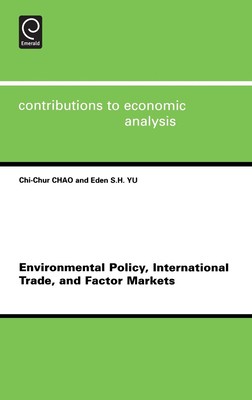
- We will send in 10–14 business days.
- Publisher: Elsevier Science Ltd
- ISBN-10: 0444517081
- ISBN-13: 9780444517081
- Format: 16.2 x 23.4 x 1.6 cm, kieti viršeliai
- Language: English
- SAVE -10% with code: EXTRA
Environmental Policy, International Trade and Factor Markets (e-book) (used book) | bookbook.eu
Reviews
Description
This book examines the intricate relationship among trade and investment policies, as well as environmental regulations, especially for developing economies. Trade liberalization via tariff reduction and market reforms has contributed significantly to the growth of the world economy. Nonetheless, one may wonder if free trade can continue to be a key factor sustaining economic growth and improving environmental quality. Under free trade, capital-abundant developed countries that produce capital intensive goods tend to emit more pollutants. This is the thrust of the so-called factor-endowment hypothesis of pollution. However, the costs of abating pollution are mounting in environmentally conscious nations due to the adoption of tougher environmental standards. The increased production costs have prompted firms in the developed nations to relocate to developing countries (the pollution haven hypothesis). Households in developing economies are mainly concerned with meeting basic needs and thus attach greater importance to issues about jobs and income. This book contributes toward understanding these issues. The impacts of pollution taxes and environmental standards on employment and social welfare are examined, the design and coordination of optimal trade, investment and environmental policies are analyzed, and their policy implications, such as aid-nature swap and backward incidence of pollution control, are provided. Finally, optimal trade and pollution policies are investigated and compared under certain and uncertain situations.
EXTRA 10 % discount with code: EXTRA
The promotion ends in 22d.20:04:25
The discount code is valid when purchasing from 10 €. Discounts do not stack.
- Publisher: Elsevier Science Ltd
- ISBN-10: 0444517081
- ISBN-13: 9780444517081
- Format: 16.2 x 23.4 x 1.6 cm, kieti viršeliai
- Language: English English
This book examines the intricate relationship among trade and investment policies, as well as environmental regulations, especially for developing economies. Trade liberalization via tariff reduction and market reforms has contributed significantly to the growth of the world economy. Nonetheless, one may wonder if free trade can continue to be a key factor sustaining economic growth and improving environmental quality. Under free trade, capital-abundant developed countries that produce capital intensive goods tend to emit more pollutants. This is the thrust of the so-called factor-endowment hypothesis of pollution. However, the costs of abating pollution are mounting in environmentally conscious nations due to the adoption of tougher environmental standards. The increased production costs have prompted firms in the developed nations to relocate to developing countries (the pollution haven hypothesis). Households in developing economies are mainly concerned with meeting basic needs and thus attach greater importance to issues about jobs and income. This book contributes toward understanding these issues. The impacts of pollution taxes and environmental standards on employment and social welfare are examined, the design and coordination of optimal trade, investment and environmental policies are analyzed, and their policy implications, such as aid-nature swap and backward incidence of pollution control, are provided. Finally, optimal trade and pollution policies are investigated and compared under certain and uncertain situations.


Reviews